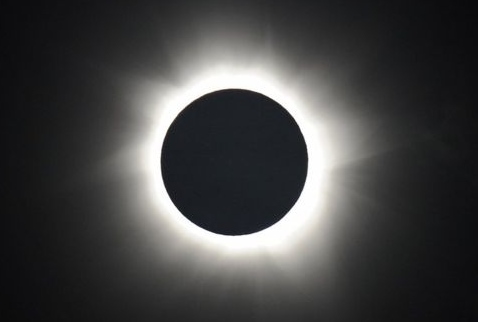A total lunar eclipse (chandra grahan) will occur on Kartik Purnima, 8th November, 2022 (17 Kartika, 1944 Saka Era). The eclipse is visible from all places of India at the time of Moonrise. However, the beginning of the partial and total phases of the eclipse is not visible from any places of India as the phenomena will be in progress before Moonrise. Ending of both the total and the partial phases is visible from the eastern parts of the country. Only the ending of the partial phase is visible from the rest parts of the country.
This eclipse will be visible in the region covering South America, North America, Australia, Asia, the North Atlantic Ocean, and the Pacific Ocean.
The eclipse will begin at 14 hr 39 min IST. The total eclipse will start at 15 hr 46 min IST. The ending time of totality is 17h 12m IST and the ending time of partial phase is 18h 19m IST.
For the cities in eastern parts of the country, like Kolkata and Guwahati, at the time of Moonrise, the total phase of the eclipse will be in progress. For Kolkata, the duration of totality from Moonrise time upto the end is 20 min and the duration from Moonrise time upto end of partial eclipse is 1 hr 27 min. For Guwahati, the duration of totality from Moonrise time upto end is 38 min and the duration from Moonrise time upto end of partial eclipse is 1 hr 45 min.
For the other cities like Delhi, Mumbai, Chennai & Bengaluru, at the time of Moonrise, the partial eclipse after the end of totality will be in progress and for the above cities, the duration from the Moonrise time upto the end of partial eclipse will be 50 min, 18 min, 40 min and 29 min respectively.
The next lunar eclipse which will be visible from India is on 28th October, 2023 and the same is a partial eclipse. Last lunar eclipse which was visible from India was on 19 November, 2021 and it was a partial eclipse.
Lunar Eclipse occurs on a full moon day when the earth comes in between the Sun and the Moon and when all the three objects are aligned. A total lunar eclipse will occur when the whole moon comes under the umbral shadow of the Earth and the partial lunar eclipse occurs when only when a part of the moon comes under shadow of the Earth. A table relating to local circumstances of some places in India is appended separately for ready reference. (Source: Positional Astronomy Centre, Kolkata; India Meteorological Department)
TOTAL ECLIPSE OF THE MOON, 8 NOVEMBER, 2022
PHASES OF ECLIPSE VISIBLE FROM CERTAIN PLACES OF INDIA
| Places | Moonrise Time
(IST) |
Umbral phase
begins at 14h 39m (IST) |
Totality
begins at 15 h 46m (IST) |
Totality
Ends at 17h 12m (IST) |
Umbral phase
Ends at 18 h 19m ( IST) |
Duration of eclipse (from Moonrise time upto the end of umbral phase) |
| h m | h m | h m | h m | h m | h m | |
| Agartala | 16 38 |
Beginning of partial phase is not visible as the phenomenon will be in progress before moonrise of any place in India |
Beginning of totality phase is not visible as the phenomenon will be in progress before moonrise of any place in India |
Visible | Visible | 1 41 |
| Ahmadabad | 17 56 | * | Visible | 0 23 | ||
| Aijawl | 16 32 | Visible | Visible | 1 47 | ||
| Ajmer | 17 43 | * | Visible | 0 36 | ||
| Allahabad | 17 15 | * | Visible | 1 04 | ||
| Amritsar | 17 33 | * | Visible | 0 46 | ||
| Bangalore | 17 50 | * | Visible | 0 29 | ||
| Bhagalpur | 16 54 | Visible | Visible | 1 25 | ||
| Bhopal | 17 36 | * | Visible | 0 43 | ||
| Bhubaneswar | 17 06 | Visible | Visible | 1 13 | ||
| Cannanore | 18 01 | * | Visible | 0 18 | ||
| Chandigarh | 17 23 | * | Visible | 0 56 | ||
| Chennai | 17 39 | * | Visible | 0 40 | ||
| Cochin | 17 59 | * | Visible | 0 20 | ||
| Cooch Behar | 16 42 | Visible | Visible | 1 37 | ||
| Cuttack | 17 05 | Visible | Visible | 1 14 | ||
| Darjeeling | 16 46 | Visible | Visible | 1 33 | ||
| Dehradun | 17 22 | * | Visible | 0 57 | ||
| Delhi | 17 29 | * | Visible | 0 50 | ||
| Dibrugarh | 16 17 | Visible | Visible | 2 02 | ||
| Dwarka | 18 12 | * | Visible | 0 07 | ||
| Gandhinagar | 17 55 | * | Visible | 0 24 | ||
| Gangtok | 16 44 | Visible | Visible | 1 35 | ||
| Guwahati | 16 34 | Visible | Visible | 1 45 | ||
| Gaya | 17 03 | Visible | Visible | 1 16 | ||
| Haridwar | 17 21 | * | Visible | 0 58 | ||
| Hazaribagh | 17 02 | Visible | Visible | 1 17 | ||
| Hubli | 17 55 | * | Visible | 0 24 | ||
| Hyderabad | 17 40 | * | Visible | 0 39 | ||
| Imphal | 16 26 | Visible | Visible | 1 53 | ||
| Itanagar | 16 24 | Visible | Visible | 1 55 | ||
| Jaipur | 17 37 | * | Visible | 0 42 | ||
| Jalandhar | 17 28 | * | Visible | 0 51 | ||
| Jammu | 17 31 | * | Visible | 0 48 | ||
| Kanyakumari | 17 57 | * | Visible | 0 22 | ||
| Kavalur | 17 42 | * | Visible | 0 37 | ||
| Kavaratti | 18 11 | * | Visible | 0 08 | ||
| Kohima | 16 24 | Visible | Visible | 1 55 | ||
| Kolhapur | 17 59 | * | Visible | 0 20 | ||
| Kolkata | 16 52 | Visible | Visible | 1 27 | ||
| Koraput | 17 21 | * | Visible | 0 58 | ||
| Kozikode | 17 59 | * | Visible | 0 20 |
* Indicates Moon rises after the corresponding phenomenon (i.e. corresponding phenomenon is not visible)
Source: Positional Astronomy Centre, Kolkata; India Meteorological Department
Ministry of Earth Sciences, Government of India
PHASES OF ECLIPSE VISIBLE FROM CERTAIN PLACES OF INDIA
| Places | Moonrise Time
(IST) |
Umbral phase
begins at 14h 39m (IST) |
Totality
begins at 15 h 46m (IST) |
Totality
Ends at 17h 12m (IST) |
Umbral phase
Ends at 18 h 19m ( IST) |
Duration of eclipse (from Moonrise time upto the end of umbral phase) |
| h m | h m | h m | h m | h m | h m | |
| Lucknow | 17 16 |
Beginning of partial phase is not visible as the phenomenon will be in progress before moonrise of any place in India |
Beginning of totality phase is not visible as the phenomenon will be in progress before moonrise of any place in India |
* | Visible | 1 03 |
| Madurai | 17 52 | * | Visible | 0 27 | ||
| Mangalore | 18 01 | * | Visible | 0 18 | ||
| Midnapore | 16 57 | Visible | Visible | 1 22 | ||
| Mount Abu | 17 53 | * | Visible | 0 26 | ||
| Mumbai | 18 01 | * | Visible | 0 18 | ||
| Murshidabad | 16 49 | Visible | Visible | 1 30 | ||
| Muzaffarpur | 16 59 | Visible | Visible | 1 20 | ||
| Mysore | 17 54 | * | Visible | 0 25 | ||
| Nagpur | 17 32 | * | Visible | 0 47 | ||
| Nalgonda | 17 37 | * | Visible | 0 42 | ||
| Nasik | 17 56 | * | Visible | 0 23 | ||
| Nellore | 17 38 | * | Visible | 0 41 | ||
| Nowgong | 17 25 | * | Visible | 0 54 | ||
| Panaji | 17 59 | * | Visible | 0 20 | ||
| Patna | 17 01 | Visible | Visible | 1 18 | ||
| Pondicherry | 17 42 | * | Visible | 0 37 | ||
| Pune | 17 58 | * | Visible | 0 21 | ||
| Port Blair | 16 49 | Visible | Visible | 1 30 | ||
| Puri | 17 07 | Visible | Visible | 1 12 | ||
| Raipur | 17 22 | * | Visible | 0 57 | ||
| Rajamundry | 17 25 | * | Visible | 0 54 | ||
| Rajkot | 18 05 | * | Visible | 0 14 | ||
| Ranchi | 17 03 | Visible | Visible | 1 16 | ||
| Sambalpur | 17 12 | * | Visible | 1 07 | ||
| Shillong | 16 33 | Visible | Visible | 1 46 | ||
| Shimla | 17 24 | * | Visible | 0 55 | ||
| Sibsagar | 16 20 | Visible | Visible | 1 59 | ||
| Silchar | 16 31 | Visible | Visible | 1 48 | ||
| Siliguri | 16 46 | Visible | Visible | 1 33 | ||
| Silvassa | 17 58 | * | Visible | 0 21 | ||
| Srinagar | 17 29 | * | Visible | 0 50 | ||
| Sringeri | 17 57 | * | Visible | 0 22 | ||
| Tamelong | 16 25 | Visible | Visible | 1 54 | ||
| Thanjavur | 17 46 | * | Visible | 0 33 | ||
| Thiruvanantapuram | 17 58 | * | Visible | 0 21 | ||
| Trichur | 17 57 | * | Visible | 0 22 | ||
| Udaipur | 17 49 | * | Visible | 0 30 | ||
| Ujjain | 17 43 | * | Visible | 0 36 | ||
| Vadodara | 17 54 | * | Visible | 0 25 | ||
| Varanasi | 17 10 | Visible | Visible | 1 09 | ||
| Vijayawada | 17 33 | * | Visible | 0 46 |
* Indicates Moon rises after the corresponding phenomenon (i.e. corresponding phenomenon is not visible)
Source:PIB







 Finance
Finance







